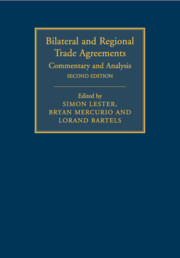Book contents
- Frontmatter
- Contents
- List of contributors
- Foreword
- Table of Cases
- Table of treaties and international agreements
- List of abbreviations
- Part I Introduction
- Part II Economics and politics of PTAs
- Part III Relationship with WTO and international law
- Part IV Legal aspects of PTAs: A comparative analysis
- 8 Agriculture
- 9 Regional trade agreements and trade in services
- 10 Investment
- 11 Government procurement
- 12 Intellectual property
- 13 Social issues: Labour, environment and human rights
- 14 Dispute settlement
- Index
12 - Intellectual property
from Part IV - Legal aspects of PTAs: A comparative analysis
Published online by Cambridge University Press: 05 October 2015
- Frontmatter
- Contents
- List of contributors
- Foreword
- Table of Cases
- Table of treaties and international agreements
- List of abbreviations
- Part I Introduction
- Part II Economics and politics of PTAs
- Part III Relationship with WTO and international law
- Part IV Legal aspects of PTAs: A comparative analysis
- 8 Agriculture
- 9 Regional trade agreements and trade in services
- 10 Investment
- 11 Government procurement
- 12 Intellectual property
- 13 Social issues: Labour, environment and human rights
- 14 Dispute settlement
- Index
Summary
I. Introduction
The Agreement on Trade-Related Aspects of Intellectual Property Rights (TRIPS Agreement) forever changed the relationship between intellectual property (IP) and international trade. While there had always been a link between IP and international trade, the TRIPS Agreement formally integrated the two areas at the multilateral level for the first time. The TRIPS Agreement is comprehensive in its coverage of IP: it deals with copyright and related rights, trademarks, geographical indications (GIs), industrial designs, patents, layout-designs of integrated circuits and protection of undisclosed information, and contains further provisions relating to anti-competitive practices in contractual licences and enforcement of IP rights. Further, much like other covered agreements of the WTO, the most-favoured-nation (MFN) and national treatment (NT) principles lie at the heart of the Agreement.
Where the TRIPS Agreement is perhaps unusual is that it establishes standards of IP protection that each WTO Member must accord to nationals of other Members. Such a regulatory, harmonised approach is different from the approaches of the other covered agreements of the WTO and might have prevented further developments outside of the multilateral forum. However, Members are specifically permitted under the Agreement to apply higher levels of protection if they so desire, as long as the principles of MFN and NT are respected. Thus unlike Article XXIV of the GATT, Article 4 of the TRIPS Agreement does not exempt Preferential Trade Agreements (PTAs) from the operation of MFN – any Member which grants ‘any advantage, favour, privilege or immunity’ to the nationals of any other country (whether a WTO Member or not) must accord the same treatment to the nationals of other WTO Members.
Such higher standards of IP protection than those mandated by the TRIPS Agreement are often called ‘TRIPS-Plus’ provisions. Members may negotiate PTAs which provide for TRIPS-Plus provisions that require, inter alia, the inclusion of additional protectable subject matter, broader and more extensive standards of protection, stronger enforcement mechanisms, and a weakening of ‘flexibilities’ and ‘special and differential treatment’ granted to developing and least developed countries in the TRIPS Agreement. The effect of these provisions is, in part, to ‘ratchet up’ international IP standards, as the more PTAs are negotiated, the more far-reaching the implications of the PTA provisions become.
- Type
- Chapter
- Information
- Bilateral and Regional Trade AgreementsCommentary and Analysis, pp. 324 - 363Publisher: Cambridge University PressPrint publication year: 2016
- 1
- Cited by



